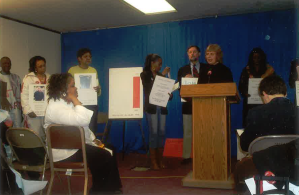 “Family Members: Equal Partners in Mental Health Recovery”
“Family Members: Equal Partners in Mental Health Recovery”
“You kind of go into a bubble, a different mindset; there is another thing added to your life that is full of fear because you don’t know what’s going to happen, or if he’s even going to get up the next morning or if he’s not going to be killed in there because there is so much violence and tumult in the prisons. And you’re frustrated because no one is listening to you, and that means the OMH staff doesn’t really connect with what we’re going through. And I always hear people say… family members know the most because they know the person the best. And what happens when we try to share what we know? It’s always the opposite! If I call up and say he’s depressed, he’s upset… I get the answer, “No, he’s fine”… And it’s very frustrating… where’s the miss here? If we know the person so well and we’re trying to share, why isn’t there a better communication back and forth, so we can explain what we know and you can explain why you’re coming in with your response?”
– Member of the Family Committee at a training for OMH Staff at CNYPC
The MHASC Family Committee has presented to OMH staff on two occasions. The objective of these trainings is to share the family member’s experience of having a loved one who is incarcerated and discussing ways in which OMH staff can work cooperatively with family members towards their patient’s recovery. OMH staff who have attended these trainings have expressed that hearing the firsthand accounts of family members who have struggled to stay in touch with and advocate for their loved one’s has sensitized them to the ways in which they can work collaboratively with these individual’s. The Family Committee has created a list of Training Takeaways around which they have formatted these powerful presentations.
The Family Committee is made up of individuals who’s loved ones are either currently or formerly incarcerated. For more information about how to get involved with this committee or participate in the trainings, please email Jennifer Parish at jparish@urbanjustice.org.
DOCCS Trainings
A critical element for the successful implementation of the SHU Exclusion Law is
greater training for Corrections staff around the challenges faced by
individual’s living with a mental illness while incarcerated. The Speaker’s
Bureau is a developing group of formerly incarcerated individuals who utilized
mental health services and are willing to share some of the positive and
negative aspects of their incarceration. Working in collaboration with DOCCS,
the MHASC Speaker’s Bureau is working towards providing video testimony to be
used during annual Mental Health trainings, as well as presenting in-person
trainings, in order to provide DOC staff with information about behavior that
is helpful towards and recovery and behavior that can be harmful towards
recovery.